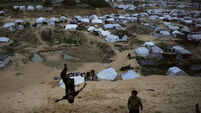Leaders convene at United Nations as world convulses in war

World leaders begin convening on Monday at one of the most volatile moments in the United Nations’ 80-year history.
The challenges they face are as dire as ever if not more so – unyielding wars in Gaza and Ukraine, escalating changes in the US approach to the world, hungry people everywhere and technologies that are advancing faster than the understanding of how to manage them.














